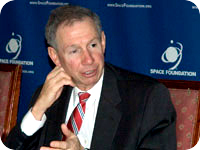Report from Washington, D.C.
Report from Washington, D.C.
Written by: developer
 On Jan. 13, the Space Foundation hosted a Space Foundation Correspondents Group featuring former NASA Administrator Michael Griffin, Ph.D. During the breakfast, Griffin addressed a variety of issues, including the national security value of U.S. international cooperation in civil space and the importance of investing in the superiority of the U.S. civil space program. He also emphasized the immediate issues facing the next administration, such as funding for scientific experiments on the International Space Station (ISS), utilization of the ISS beyond 2015, and access to space during the next five years.
On Jan. 13, the Space Foundation hosted a Space Foundation Correspondents Group featuring former NASA Administrator Michael Griffin, Ph.D. During the breakfast, Griffin addressed a variety of issues, including the national security value of U.S. international cooperation in civil space and the importance of investing in the superiority of the U.S. civil space program. He also emphasized the immediate issues facing the next administration, such as funding for scientific experiments on the International Space Station (ISS), utilization of the ISS beyond 2015, and access to space during the next five years.
Space Foundation team members participated in multiple events in Washington related to the opening of the 111th Congress. On January 20th, NASA took part in the 56th Presidential Inaugural Parade. Crews from the recent STS-126 mission, along with NASA’s new Lunar Electric Rover, closed out the parade. And, 3,200 Space Foundation Certified Space Technology thermal-reflective HEATSHEETS, manufactured by AFMInc., were used to keep both people and horses warm during the inauguration.
In January, various changes in the congressional committees with jurisdiction over space policy were announced. Member changes included House Committees on Appropriations, Armed Services, Intelligence, and Science and Technology. Rep. Gabrielle Giffords (D-Ariz) will be the new Chairman of the Science and Technology Space and Aeronautics subcommittee, with Rep. Pete Olson (D-Texas) taking over as the Ranking Member. Rep. Ellen Tauscher (D-Calif) remains the Chairman of the Armed Services’ Strategic Forces subcommittee and Rep. Michael Turner (R-Ohio) becomes the Ranking Member. On the Senate side, most committee assignments were finalized last month, with subcommittee assignments expected soon.
The latest economic stimulus bill proposed in Congress includes $600 million for NASA: $400 million to put more scientists to work doing climate change research, including Earth science research recommended by the National Academies, satellite sensors that measure solar radiation critical to understanding climate change; $150 million for research, development, and demonstration to improve aviation safety and Next Generation air traffic control (NextGen); and $50 million for hurricane recovery.
Pictured: Griffin
This article is part of Space Watch: February 2009 (Volume: 8, Issue: 2).
